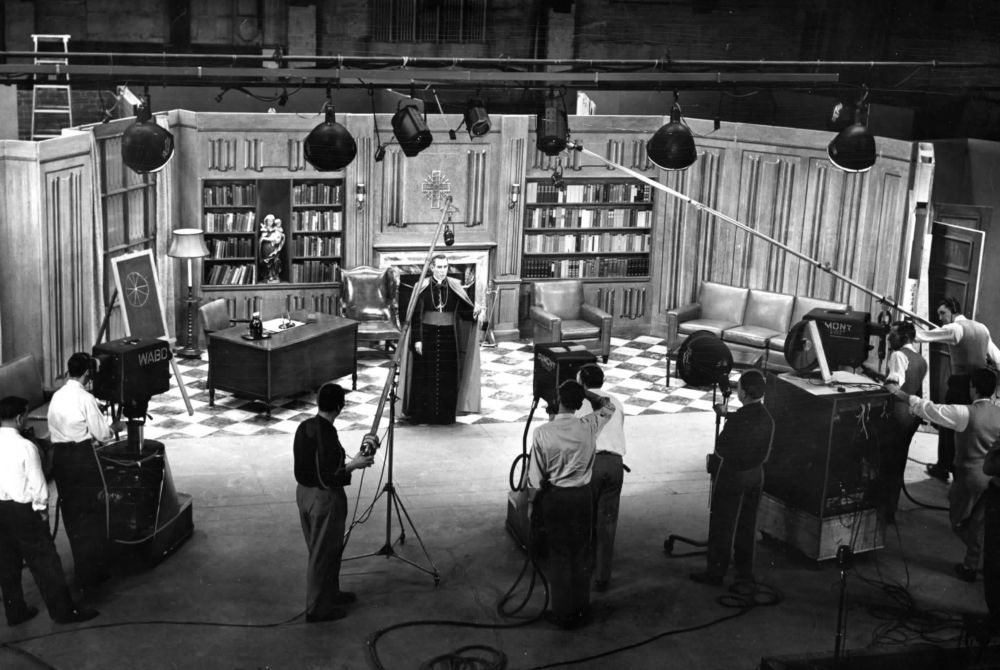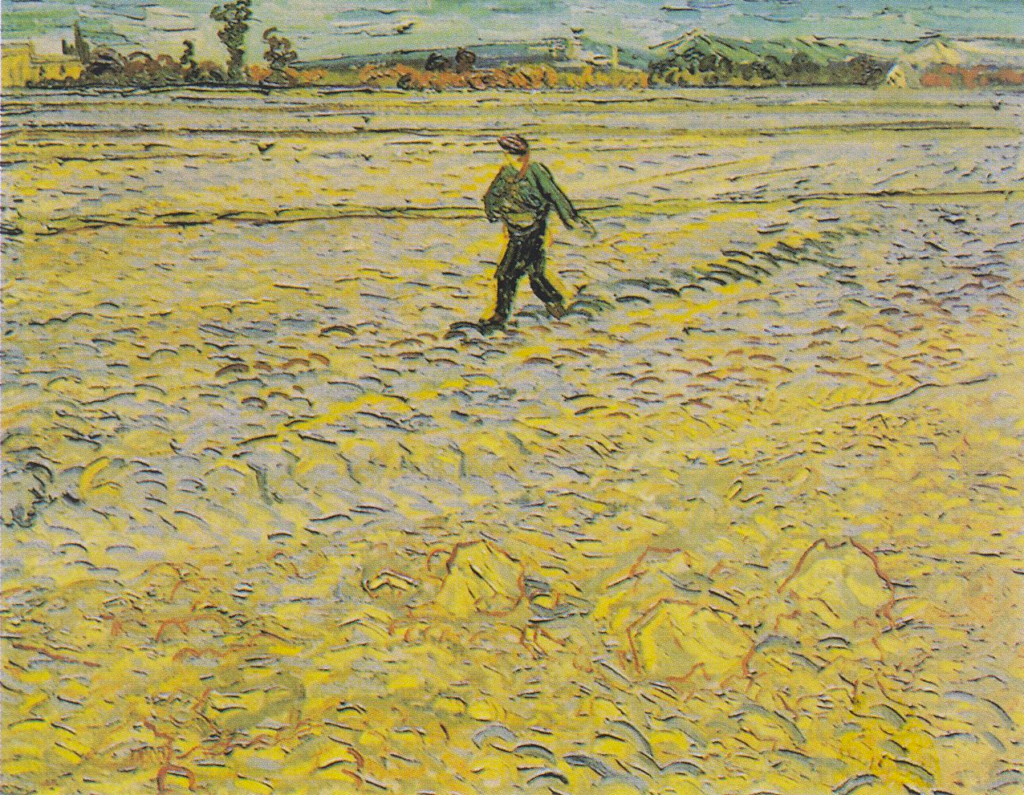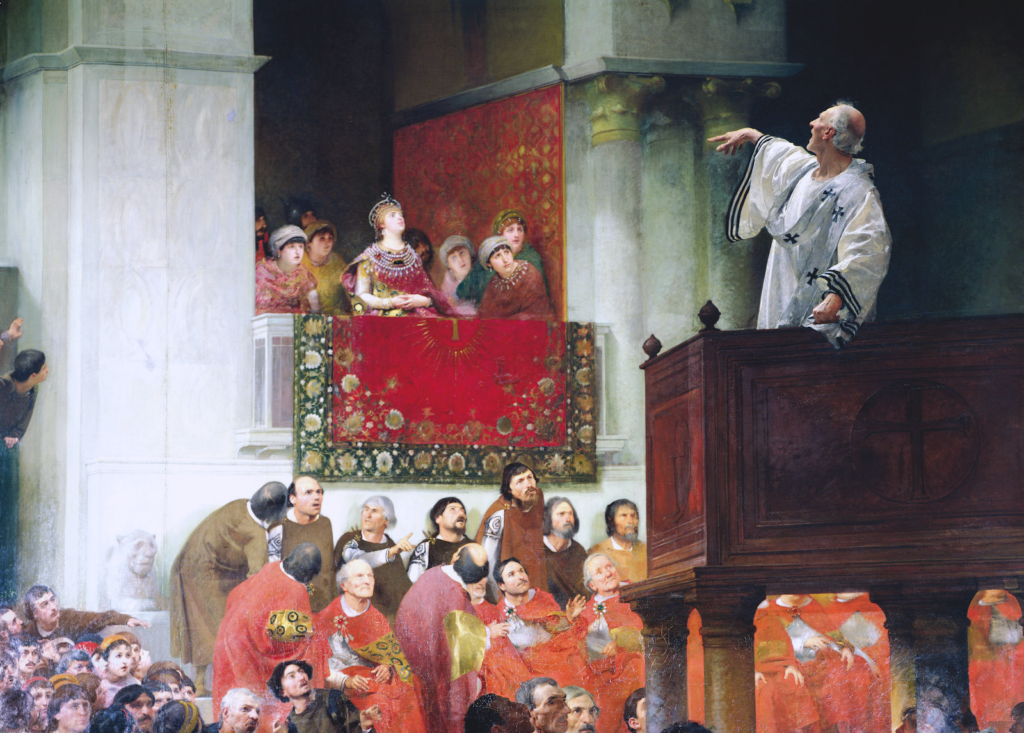Translation of the Holy Gospel According to Luke
At that time, when a very great multitude was gathered together and hastened out of the cities unto Jesus, He spoke by a similitude: The sower went out to sow his seed: and as he sowed, some fell by the wayside, and it was trodden down, and the fowls of the air devoured it. And other some fell upon a rock: and as soon as it was sprung up, it withered away, because it had no moisture. And other some fell among thorns, and the thorns growing up with it choked it. And other some fell upon good ground: and being sprung up yielded fruit a hundredfold. Saying these things, He cried out: He that hath ears to hear, let him hear. And His disciples asked Him what this parable might be. To whom He said: To you it is given to know the mystery of the kingdom of God, but to the rest in parables: that seeing they may not see, and hearing may not understand. Now the parable is this. The seed is the word of God. And they by the wayside are they that hear: then the devil cometh and taketh the word out of their heart, lest believing they should be saved. Now they upon the rock are they who, when they hear, receive the word with joy; and these have no roots: for they believe for a while, and in time of temptation they fall away. And that which fell away among thorns are they who have heard and, going their way, are choked with the cares and riches and pleasures of this life, and yield no fruit. But on the good ground are they who in a good and perfect heart, hearing the word, keep it, and bring forth fruit in patience.
From St. Pope John Paul II’s Address to the Episcopal Conference of Zambia, May 2, 1989.
I wish to discuss the Church’s teaching office, and the role of the diocesan bishop as an authentic teacher of the faith for his people.
Christ himself told his apostles to make disciples of all nations, teaching them to observe all that he had commanded (cfr. Matt 28:19-20). Before he returned to the Father, Jesus promised to send the Holy Spirit upon his Church, to guide her into all truth (cfr. John 16:15). Through the anointing of the Spirit of truth, the entire People of God has been enabled to cling to the faith it has received, to gain deeper insight into its mysteries, and to apply it more fully in daily life (cfr. Lumen Gentium, 12).
As successor of the apostles, the Pope and the bishops have been entrusted with the mission of preaching the Word of God. The Second Vatican Council teaches that bishops are both heralds of the faith, who draw new disciples to Christ, and authentic teachers, that is, teachers endowed with the authority of Christ, who preach to the people entrusted to their care. It falls to bishops to teach the faith, to make it bear fruit, and to be vigilant against errors that threaten their flock (ibid. 25).
In fulfilling this great task, dear brothers, we can be certain that God who entrusted it to us will also give us the grace to fulfill it. For our part, we must never fail to persevere in our task of teaching: we must search for the most suitable and effective means of accomplishing it; and we must never lose confidence in the power of the Holy Spirit whose grace we received at our ordination.
Within the local Church, the diocesan bishop is the moderator of the entire ministry of the Word (Codex Iuris Canonici 756). As such, he is called to collaborate actively with many people in the service of the Gospel. On every level of the Church’s life, it is your duty to ensure that the Word bears fruit and grows in the lives of those who believe (cfr. Col 1:6). For all members of the Church, this will require a lifelong formation in Christian doctrine and discipline and in the riches of the spiritual life. Priests, religious and laity must be continually formed in Christian living, so as to hold fast to the faith, in accordance with their particular vocation. Their knowledge of the faith must be deepened; their practice of it must determine their choices and actions; and their love for it must create the desire to share it with others.
Priests are your indispensable companions in teaching, sanctifying and shepherding God’s people, and so they should receive a spiritual and intellectual formation equal to their responsibilities. For this reason, I urge you to give special attention to the formation of those preparing for the priesthood as well as to the continuing education of those already ordained so that your priests may be of one mind and heart with you in the ministry of proclaiming the Word (cfr. Presbyterorum Ordinis, 7). Love for Christ means zeal for all his flock, especially for those who do not yet know him and those who have wandered away.
Your duty as bishops to make the faith shine forth and bear fruit (cfr. Lumen Gentium, 12) also requires you to provide for the spiritual growth of the laity… Catholics are called to occupy positions of responsibility in the civic and cultural life of this country. But vigilance is needed on your part so that the good seed of the Gospel is not snatched away or choked or does not wither amid the temptations and cares of modern life (cfr. Luke 8:11-14). You must attend to the many profound questions being asked today about the human person and society… As pastors and teachers you will want to do everything possible to help your people understand their Catholic faith in the light of their own questions about life and the challenges that may be raised by others.
This teaching task likewise calls for a systematic approach to adult catechetics suited to different groups of people. Special attention should be given to those whose social, economic or cultural status could weaken their sense of Catholic identity or their ties with the Church community. Nor can I fail to mention the solicitude required of pastors towards those who find it difficult to fulfil the Christian obligation of marriage and family life in accordance with Church teaching. Teachers of the faith must constantly call people to conversion, to perseverance, to a deeper love rooted in the Cross. We have as our inspiration the words of Saint Paul: Let your manner of life be worthy of the Gospel of Christ (Php 1:27).
Within the context of lay formation, your role as teachers also demands attention to the religious education of the young… By reaching out to them, the Church manifests Christ’s love for them. By teaching them the Gospel she helps to answer their deepest questions about life and salvation. In Catholic schools particularly they should be able to find sound catechesis in Catholic doctrine and Christian living, especially through the instruction and good example of teachers who are well prepared spiritually and intellectually for this important task.

Finally, dear brothers, I urge you to take full advantage of the communications media in furthering the Church’s teaching mission. Your use of the press, radio and television will not only serve Catholics: it will also influence and inform public opinion about the Church and her teachings. [Where] the Church enjoys freedom to make use of the media, do not, hesitate, therefore to devote the resources and the talents necessary to carry out this important ministry as part of your work as teachers of the faith.


